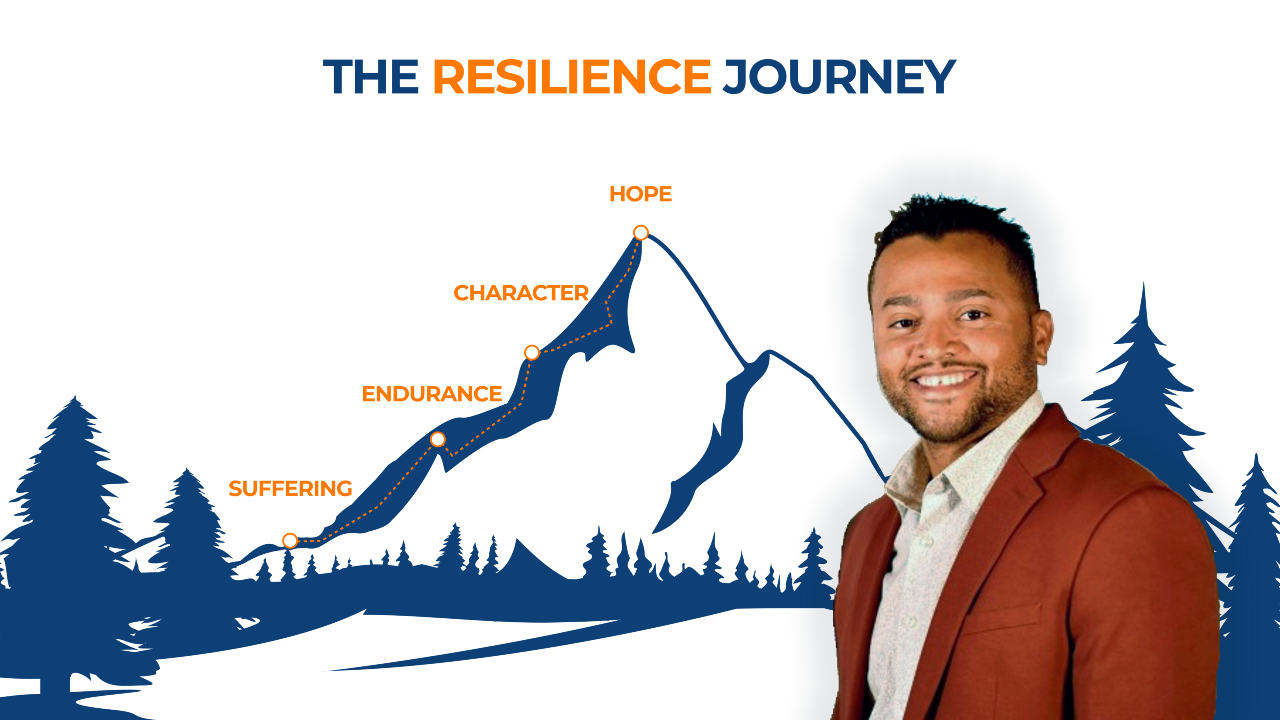In my last blog, I posed a few questions around how we as individuals define resilience, and what it means to us to be resilient. I recently had the opportunity to speak with Nathan Beene, the COO of the Grand Rapids Center for Community Transformation and a fellow EOS Implementer who I have great respect for.
In our conversation, I asked him to share his wisdom surrounding the topic of resilience. I’d love to share his knowledge with you.
Nathan, how would you define resilience?
Resilience is the ability to press on and push through extreme difficulties. It allows you to adapt to all forms of challenge, providing a perspective that sees suffering as life’s way of molding us into who we were meant to be.
When you assess resilience in others, what do you look for?
When assessing resilience in others I am looking to see how they respond to all types of difficulties. Are they naturally wired to give up, stop, quit? Or do they see their pain and struggle as necessary to move them into the next dimension of their life? At GRCCT we have a saying: “Your pain is your gateway to transformation.” I love this because I think so often in our Western culture we seek to avoid pain, challenge and difficulty by all means necessary. But to see it as a growth opportunity is a necessary shift in thinking.
I look at how they treat others around them. How well are they processing and going through their difficulty or pain? Are they lashing out because of their circumstances? Are they seeking professional help when necessary and finding healthy outlets? Are they honest about how they’re feeling while treating others with respect and love?
Additionally, I’m seeking to gauge their perspective on their difficulty. Do they see it as a meaningless obstacle, or do they see it as something to be gained, learned from, or transformed by?
When you assess resilience in organizations, what do you look for?
When assessing organizational resilience, I’m not only thinking about the seemingly obvious things that would make an organization resilient, like cash reserves, providing a world-class product or service, or having a strong and supportive ecosystem.
I’m looking to see how strong their identity is. How compelling is their vision? Is there 100% alignment with every single person in the organization as to where they are going and how they plan to get there? Does the organization know who they are and what their unique contribution to the world is? When an organization knows who they are and has a strong identity they can withstand the challenges that are sure to come.
Are the leaders committed to the organization’s vision? Are they willing to have it cost them something? Do they have all the right people in the right seats, starting with the leadership team? Does the leadership team truly understand their roles? Do their leaders possess the God-given talent, experiences and knowledge to perform the work given to them?
Are there core values in place that leadership uses to hire, fire, reward, retain and attract? Is there clear accountability within the organization? Does each person know exactly what is expected of them, and are they supported to do their best work?
I also think it’s important to assess communication rhythms and touchpoints within the organization. Do they have a regular cadence and process for getting to—and solve—the root cause of issues? Are touchpoints productive, creating clear action items with reasonable deadlines that move projects in the right direction?
Lastly—and what I would argue is most important—does the leadership team exhibit a high level of trust and vulnerability with each other? Are they open and honest, even when it hurts? Can they put their egos aside and act on behalf of the greater good of the organization? All together, these are the signs I see that make an organization truly resilient.
What person in your life would you hold up as being resilience personified? What have they done that makes them stand out for you?
After giving this a lot of thought, I have to say the person in my life that I would hold up as being resilience personified is my beautiful, courageous 16-year-old daughter. She is a special soul and I rarely tell her this enough, but I genuinely look up to her.
I officially adopted her when she was 9 years old, but have been raising her since the age of 1. I always tell her that I married her mom because I first fell in love with her and, after a few short months of being around her, I could not imagine my life without this talented, unique personality and little bundle of love and joy.
Throughout her childhood, she experienced some challenging, unfortunate experiences with her biological father that have been difficult to reconcile. Additionally, she was recently diagnosed with a mild heart condition that often creates physical discomfort, dizziness, exhaustion, etc. Through all of this, she has remained resilient.
She’s achieved a 4.0 GPA in the top high school in Michigan, but her academic achievements only scratch the surface. She’s growing into an excellent musician, artist and creative. She is a wonderful and loving friend, plays tennis, and takes ownership over her physical and mental health. She doesn’t allow her past to define her future, and I could not be more proud of her.
In your own leadership journey – what has been a key resilient building event? In hindsight, how did it build your resilience capacity?
My leadership journey has contained many resilience-building events, but it’s difficult to choose just one. Managing our business through COVID-19. Experiencing floods and fires in our building. Deaths amongst our staff. My own health issues over the years. All these things build resilience and grit in me, both as a person and leader.
There were many times in the last 15 years where I felt like giving up, asking myself if it’s even worth it. We’ve all heard the sayings: No pain, no gain. Blood, sweat and tears. Diamonds are forged in fire. All these point to the idea that struggle and pain are inevitable, temporary, and merely a milestone on the journey of success.
I remember back in 2021, during the height of the COVID pandemic, my brother—who is also my mentor—told me that God is the most strategic, talented investor in the world. He told me that He will waste none of your experiences, trials, or tribulations. He will use them for greater purposes. That was a turning point for me mentally, and I began embracing my struggles. Instead of resenting them, I shifted to view them as opportunities for myself and those around me to grow.
In your organization, what has been a key resilient building event? In hindsight, how did it build your organizational resilience?
Like many organizations, the COVID-19 pandemic really put us to the test. Having to lay off our staff, losing significant money on canceled contracts, and—most importantly—real stories of real people dying around us.
When we finally returned to work, the restrictions made it incredibly difficult to operate. About 40% of our staff was sick at any given time. HR compliance laws constantly changed, as well as health and safety policies. The additional costs associated with maintaining a healthy workplace seemed like the cherry on top, but the list goes on: staff quitting due to not feeling safe, shrinking revenues, operational inefficiencies and more.
Overall, the pandemic took a serious toll on everyone’s mental, emotional and physical health.
Reflecting back on this time, the many ways we needed to adapt built a greater sense of trust, unity and vulnerability throughout our organization. It felt like we’d gone to war together, fought for our livelihood as a team. Everyone had been in the trenches, stepping up to the plate and filling vacancies as we adapted to that dreaded “new normal.” Our team members that stuck around through COVID remember those times as defining moments when we truly became a team.
Lastly, I would be remiss if I did not mention the very practical, yet strategic role that EOS played through all of this hardship. I cannot imagine a company going through the pandemic without an operating system like EOS. We relied on our quarterly meetings to inspire, cast vision, and share the company’s direction. When we lost staff, the Accountability Chart helped us fill in gaps as we restructured. The weekly L10 meeting pulse ensured we stayed on track with quarterly rocks, and our Scorecard kept us accountable as we regularly solved new issues. These were not just supplemental tools that helped out a little bit, they were core to our survival.
How is your resilience (personal or organizational) being tested today? What is one past lesson that is helping you meet that challenge?
Most recently our organization has had a few key leadership positions transition to other opportunities. Change is always hard, especially when you’re in leadership and are responsible for filling in gaps when they arise. Taking charge on our transition plan as we work to find replacements while protecting our culture is no easy task, but the work is vital.
Despite the stress, my belief that God doesn’t waste any experiences, struggles or difficulties has helped me shift my perspective. While that perspective is sometimes hard to maintain, I know I’ll learn important lessons from this difficult time. Sometimes that lesson might be as simple as recognizing when an individual isn’t a good culture, or it may be that I need to more intentionally create a culture that makes the right fits want to stay. Either way, there’s new knowledge and understanding for me to gain.
Connect with Nathan
If you’d like to connect with Nathan, you can send him a request on LinkedIn or email him at nathan.beene@eosworldwide.com. To learn more about his company, Grand Rapids Center for Community Transformation, on their website. You can also check out his EOS Microsite for additional details on his EOS-related offerings and insights.

